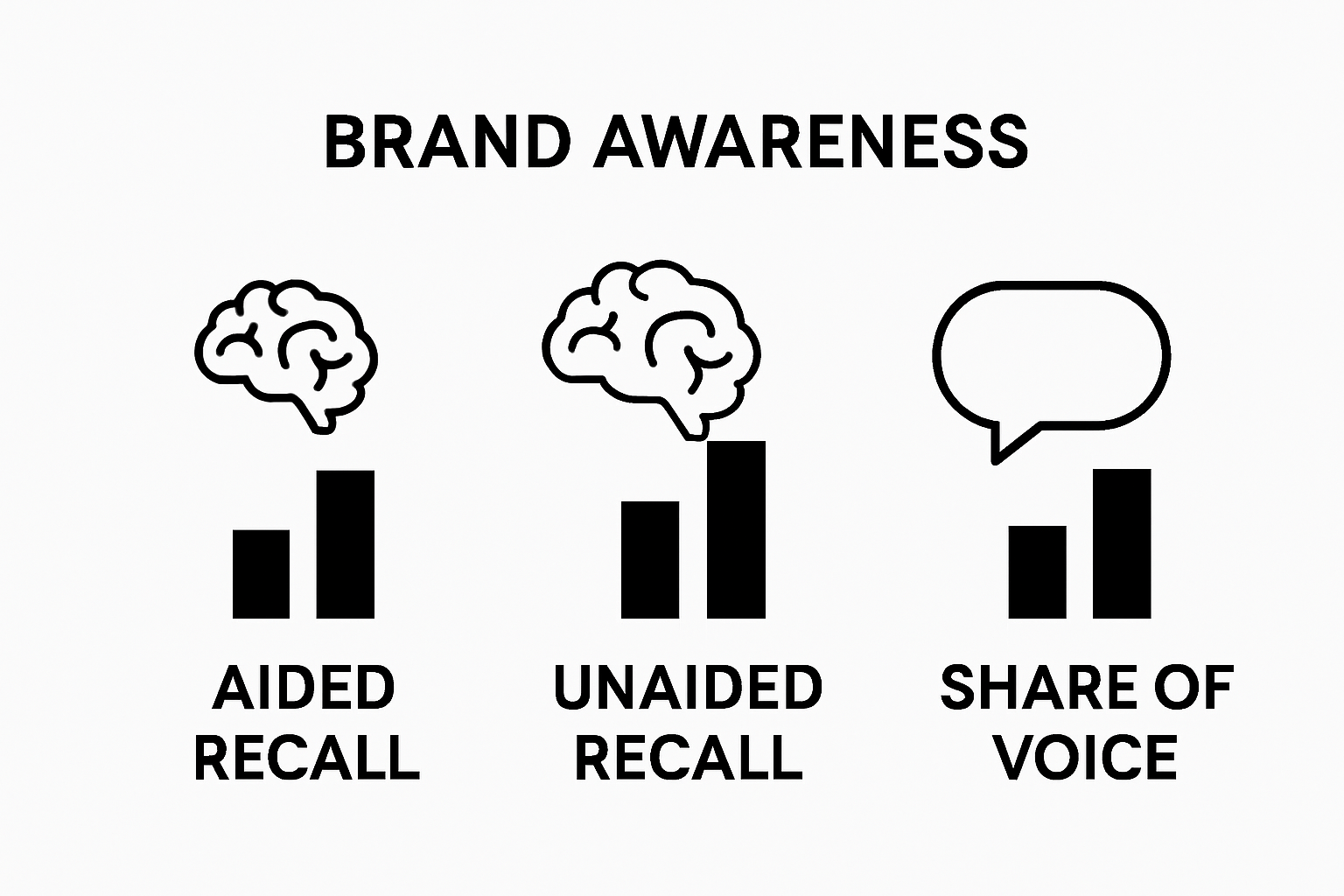Branding Elements That Drive Small Business Growth

Discover what is brand awareness in marketing and why it’s crucial for your business growth. Gain clarity on its impact and practical applications.

Brand awareness shapes how people see your business and whether they trust you enough to buy. Every shopper faces a flood of choices every day, but studies show consumers are far more likely to pick brands they recognize and recall with ease. Most people assume flashy ads grab the spotlight, yet what really matters is building small moments of memory that stick. This hidden side of brand awareness holds the real power to win customer loyalty and drive long-term success.
Brand awareness represents the foundational pillar of marketing strategy, serving as the critical first step in how consumers recognize and connect with a business. At its core, brand awareness describes the extent to which potential customers can identify, recall, and distinguish a specific brand within a marketplace.
The concept of brand awareness operates through complex psychological mechanisms. When consumers encounter a brand repeatedly, their brain creates neural pathways that establish recognition and familiarity. Research from marketing psychology experts reveals that brand awareness is not just about visual recognition, but about creating a memorable impression that resonates emotionally and intellectually.
Brand awareness transforms from a passive concept into a strategic marketing asset when businesses understand its deeper implications. It represents more than mere name recognition—it’s about creating a lasting mental imprint that differentiates a brand from competitors. For entrepreneurs and small businesses, developing strong brand awareness means crafting a narrative that speaks directly to target audiences.
Interested in diving deeper into building a robust brand strategy? Check out our comprehensive brand strategy guide that breaks down how to create meaningful connections with your audience.
Successful brand awareness isn’t about loud marketing but about creating genuine, memorable experiences that stick in consumers’ minds. By understanding the psychological and strategic dimensions of brand recognition, businesses can develop more nuanced, effective marketing approaches that truly resonate with their target market.
Below is a table summarizing the main psychological mechanisms behind brand recognition, helping to clarify how each contributes to overall brand awareness.
MechanismDescriptionCognitive RecallAbility to retrieve brand information from memoryVisual AssociationConnecting brand logos, colors, and design elementsEmotional ConnectionDeveloping positive feelings and associations with a brandMental ShortcuttingUsing prior brand knowledge to make faster decisionsRisk ReductionAssociating familiarity with credibility and safety in choosing a brandEmotional ValidationForming positive predispositions toward brands that feel familiar
Brand awareness transcends simple name recognition, functioning as a strategic cornerstone that directly impacts business growth, customer relationships, and market positioning. For entrepreneurs and small business owners, understanding its critical role can transform marketing from a cost center to a value generator.
In crowded marketplaces, brand awareness becomes a powerful differentiator. It transforms a business from being just another option to becoming a memorable, preferred choice. Strong brand awareness means consumers think of your brand first when considering a product or service.
This psychological positioning provides significant competitive advantages. When customers have multiple options, they gravitate towards brands they recognize and feel comfortable with. Learn how to develop a robust brand strategy that goes beyond surface-level recognition and creates genuine connections.
Ultimately, brand awareness is not about being the loudest voice in the market, but about being the most authentic and consistently memorable presence. By strategically building recognition, businesses can create lasting impressions that translate directly into market share, customer loyalty, and sustainable growth.
Consumer decision-making is a complex psychological process where brand awareness plays a pivotal role in shaping purchasing behaviors. By understanding how brand recognition impacts cognitive processes, businesses can strategically position themselves to influence customer choices more effectively.
Research from cognitive psychology studies reveals that brand awareness operates at both conscious and unconscious levels of consumer cognition. When consumers encounter familiar brands, their brains process information more quickly and efficiently, reducing perceived risk and uncertainty
Brand awareness acts as a powerful psychological trigger that transforms passive recognition into active purchasing motivation. Consumers are inherently more likely to select brands they know and feel comfortable with, even when objective product qualities might be similar across alternatives.
This psychological preference stems from fundamental human tendencies to seek certainty and minimize cognitive effort.

When faced with multiple choices, consumers typically gravitate toward brands that feel familiar and trustworthy. Explore our comprehensive guide on developing brand messaging to understand how to create these powerful psychological connections.
Ultimately, brand awareness is not just about being remembered but about being remembered in a way that instills confidence, reduces perceived risk, and creates an emotional connection that subtly guides consumer choices toward your brand.
Measuring brand awareness requires a strategic approach that goes beyond superficial metrics. Entrepreneurs and marketers need precise tools to understand how deeply their brand resonates with target audiences and track meaningful engagement indicators.
Research from marketing measurement experts highlights several critical quantitative metrics for assessing brand awareness. These metrics provide objective insights into a brand’s market presence and consumer perception.

Digital platforms offer sophisticated tools for tracking brand awareness with unprecedented precision. Modern measurement techniques leverage online interactions, social media engagement, and web analytics to provide real-time insights into brand recognition and audience sentiment.
These digital tracking methods allow businesses to:
Discover advanced strategies for increasing brand visibility and understand how to translate these metrics into actionable marketing insights.
Effective brand awareness measurement is not about collecting data but interpreting it strategically.
This table provides an overview of key metrics used for measuring brand awareness, making it easier to compare their focus and application in marketing.
MetricWhat It MeasuresApplication in MarketingAided RecallRecognition of the brand when promptedAssesses how familiar a brand is with cuesUnaided RecallRemembering the brand without any promptsEvaluates deep brand recallShare of VoiceBrand mentions compared to competitorsGauges competitive brand presenceSocial MentionsFrequency of brand mentioned onlineTracks online visibility and discussionsEngagement RateLikes, shares, comments on digital contentMeasures audience interactionWebsite TrafficVisits to branded web content or keywordsIndicates interest and searchability
If you ever feel like your brand is “recognized” but not truly remembered or chosen, you are not alone. The article stressed how surface-level recognition is not enough. What matters is building emotional connection, strategic recall, and genuine visibility so your brand actually shapes purchasing decisions. If you are tired of marketing scattershot approaches or if your efforts never seem to stick, it is time to use a system that blends brand psychology with practical frameworks.

See how Reasonate Studio helps entrepreneurs and small business owners create sustainable visibility using The Aligned Impact Model™. We go way beyond basic brand recall, working with you to develop strategy, messaging, and visual clarity that set you apart. Discover how our unique approach aligns your marketing activity with your business goals.
If you want to move past fleeting impressions and build a brand that truly lasts, your next step starts now. Visit Reasonate Studio to see how we can elevate your brand awareness and turn it into measurable, lasting growth.
Brand awareness refers to the extent to which potential customers can recognize, recall, and differentiate a brand within a marketplace. It is the foundational element of marketing strategy that impacts consumer behavior and decision-making.
Brand awareness is crucial for businesses as it builds trust and familiarity among consumers. Strong brand awareness can lead to increased customer loyalty, more effective marketing, and a greater market share by differentiating the brand from competitors.
Brand awareness can be measured using various metrics, including aided recall and unaided recall, as well as digital tracking methods such as social media engagement and website traffic analytics to assess consumer recognition and sentiment.
Psychological factors that influence brand awareness include cognitive recall, visual association, and emotional connection. These mechanics help consumers recognize brands and develop preferences based on familiarity and positive feelings.